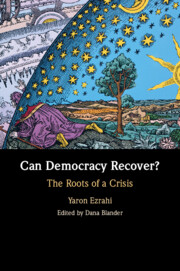Book contents
- Can Democracy Recover?
- Can Democracy Recover?
- Copyright page
- Dedication
- Contents
- Preface
- Words from the Author
- Introduction
- Part I The Rise of Western Politics following the Collapse of the Monistic Medieval Cosmology
- Part II The Emergence of the Epistemological Constitution of Modern Democracy
- 4 The Imaginary of the Modern Democratic Individual as a Political Agency
- 5 Democratic Political Causality
- 6 Public Facts as Political Currency
- 7 The Visibility and Accountability of Political Power
- 8 Objectivity as a Fictional Limit of the Political
- Part III The Dialectics of Objectification
- Part IV The Erosion of the Epistemological Constitution of Modern Democracy
- Part V Democracy beyond Modernity
- Can Democracy Recover? Concluding Reflections
- Epilogue
- Index
6 - Public Facts as Political Currency
from Part II - The Emergence of the Epistemological Constitution of Modern Democracy
Published online by Cambridge University Press: 02 January 2025
- Can Democracy Recover?
- Can Democracy Recover?
- Copyright page
- Dedication
- Contents
- Preface
- Words from the Author
- Introduction
- Part I The Rise of Western Politics following the Collapse of the Monistic Medieval Cosmology
- Part II The Emergence of the Epistemological Constitution of Modern Democracy
- 4 The Imaginary of the Modern Democratic Individual as a Political Agency
- 5 Democratic Political Causality
- 6 Public Facts as Political Currency
- 7 The Visibility and Accountability of Political Power
- 8 Objectivity as a Fictional Limit of the Political
- Part III The Dialectics of Objectification
- Part IV The Erosion of the Epistemological Constitution of Modern Democracy
- Part V Democracy beyond Modernity
- Can Democracy Recover? Concluding Reflections
- Epilogue
- Index
Summary
This chapter explores the relationship between facts, politics, and our understanding of reality. It distinguishes scientific facts, based on theories, from political facts, which rely on commonsense. The chapter emphasizes the need for political facts to be made public to gain legitimacy. Scientific facts have had a significant impact on shaping political and social facts, particularly considering the division between Nature/Culture. The perception of Nature as a solid object and as a system of reliable, repetitious regularities became an ideal for the political and moral universe, as can be seen in Kant’s use of the nature analogy to reinforce his categorical imperative. Public facts act as both the currency and the counters of democratic citizens, enabling power decentralization and resistance against its abuses. The chapter also refers to how Thomas Kuhn’s Theory of Scientific Revolutions has challenged the autonomy of Nature and science, affecting the status of facts in natural and social sciences as well as in politics. The chapter concludes by noting that trust in objective facts as the foundation of modern commonsense has been weakened, highlighting the evolving nature of facts and their significance in contemporary democratic societies.
Keywords
- Type
- Chapter
- Information
- Can Democracy Recover?The Roots of a Crisis, pp. 70 - 76Publisher: Cambridge University PressPrint publication year: 2025

